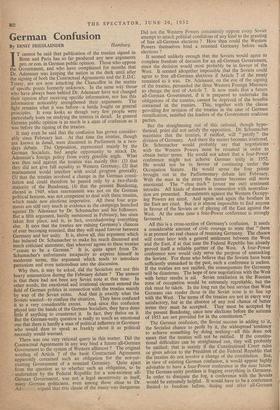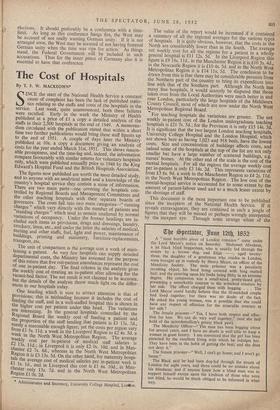German Confusion
IT cannot be said that publication of the treaties signed in Bonn and Paris has so far produced any new arguments pro. or con. in German public opinion. Those who oppose the Government, and who have complained for months that Dr. Adenauer was keeping the nation in the dark until after the signing of both the Contractual Agreements and the E.D.C. Treaty, are not now attacking the Chancellor in the matter of specific points formerly unknown. In the same way those., who have always been behind Dr. Adenauer have not changed their opinion after receiving specific information, nor has this information noticeably strengthened their arguments. The fight remains what it was before—a battle fought on general principles. It even looks as though very few people were particularly keen on studying the treaties in detail. In general German public opinion is as much in a state of confusion as it was before the signing of the treaties.
It may even be said that the confusion has grown consider- ably since February last. At that time the treaties, though not known in detail, were discussed in Parliament in a two- days debate. The Opposition, represented mainly by the German Socialists, had ample opportunity to attack Dr.
Adenauer's foreign policy from every possible angle. What was then said against the treaties was mainly this: (1) that they did not give full equality to Western Germany, (2) that rearmament would interfere with social progress generally, (3) that the treaties involved a change in the German consti- tution and could therefore be passed only by a two-thirds majority of the Bundestag, (4) that the present Bundestag, elected in 1949, when rearmament was not on the German political horizon, was not competent to deal with these treaties, which made new elections imperative. All these four argu- ments are still very much in evidence in the campaign launched against Dr. Adenauer by Dr. Schumacher and his followers. But, a fifth argument, hardly mentioned in February, has since taken first place; and is, in fact, overshadowing everything else. It says that the treaties are ruining Germany's chances of ever becoming reunited, that they will stand forever between Germany and her unity. It is, above all, this argument which has induced Dr. Schumacher to make his much discussed and much criticised statement, that whoever agrees to these treaties " ceases to be a German." It is, quite apart from Dr. Schumacher's unfortunate incapacity to express himself in moderate terms, this argument which tends to introduce patriotism and even nationalism into the discussion.
Why then, it may be asked, did the Socialists not use this heavy ammunition during the February debate ? The answer is that there had not been any Soviet note at that time. In other words, the emotional and irrational element entered the field of German politics in connection with the treaties mainly by way of the Soviet notes. And that is exactly what the Soviets wanted—to confuse the situation. They have confused it to a very considerable extent. And since this confusion played into the hands of the German Socialists, they have done little if anything to counteract it. In fact, they thrive on it. But the German-unity question is really so much an emotional one that there is hardly a man of political influence in Germany who would dare to speak as frankly about it as political necessity would warrant.
There was one very rational query in this matter. Did the Contractual Agreements in any way bind a future all-German Government to the system of Western alliances ? The original wording of Article 7 of the basin Contractual Agreement apparently contained such an obligation for the not-yet- existing Government of a reunited Germany. Quite apart from the question as to whether such an obligation, to be undertaken by the Federal Republic for a non-existent all- German Government, was not a legal monstrosity in itself, many German politicians, even among those close to DE. Acl'i' - . argued that this clauge of the treaty was dangerous. Did not the Western powers consistently oppose every Soviet attempt to attach political conditions of any kind to the granting of free all-German elections ? How then could the Western Powers themselves bind a reunited Germany before such elections ?
It seemed unlikely enough that the Soviets would agree to complete freedom of decision for an all-German Government, since the decision would most probably be in favour of the West. It seemed altogether impossible that the Soviets could agree to free all-German elections if Article 7 of the treaty remained as it was. Dr. Adenauer, on the eve of the signing of the treaties, persuaded the three Western Foreign Ministers to change the text of Article 7. It now reads that a future all-German Government, if it is prepared to undertake the obligations of the treaties, cannot be deprived of the benefits contained in the treaties. This, together with the clause providing .for revision of the treaties in the case of German reunification, satisfied the leaders of the Government coalition parties.
But the straightening out of this rational, though hypo- thetical, point did not satisfy the opposition. Dr. Schumacher maintains that the treaties, if 'ratified, will "petrify " the division of Germany. And there the matter becomes irrational. Dr. Schumacher would probably say that negotiations with the Western Powers must be resumed in order to obtain better terms. He would not admit that a four-Power conference might not achieve German unity in 1952. He would not be in favour of continuing under the Occupation Statute. He would stress the four points brought out in the Parliamentary debate last February. With the man in the street the matter becomes still more emotional. The " ohne mich " (count me out) sentiment intrudes. All kinds of dreams in connection with neutralisa- tion are presented. Resentments against the Western Occupy- ing Powers are aired, And again and again the brothers in the Eagt are cited. But it is almost impossible to find anyone in favour of the Soviets or of playing off the East against the West. At the same time a four-Power conference is strongly favoured.
All this is a cross-section of Germany's confusion. It needs a considerable amount of civic courage to state that " there is at present no real chance of reuniting Germany. The chance will come later with a general settlement between the West and the East, if at that time the Federal Republic has already proved itself a reliable partner of the West. A four-Power conference now would only serve the purpose of unmasking the Soviets. For those who believe that the Soviets have been sufficiently unmasked in the past, such a conference is useless. If the treaties are not ratified, the consequences for Germany will be disastrous. The hope of new negotiations with the West with better results is nil. Soviet retaliation in the Russian zone of occupation would be extremely regrettable, but the risk must be taken. In the long run the best service that West Germans can render those in the Soviet zone is to line up with the West. The terms of the treaties are not in eery way satisfactory, but in the absence of any real chance of better terms they must be accepted. They must be accepted by the present Bundestag, since new elections before the autumn of 1953 are not provided for in the constitution."
The German confusion, the Soviet success in adding to' it, the Socialist chance to profit by it, the widespread'tendency to achieve something by doing nothing—all this does not mean that the treaties will not be ratified. If the constitu- tional difficulties can be straightened out, they will probably be ratified; that is mainly if the Constitutional Court rules or gives advice to the President of the Federal Republic that the treaties do not involve a change of the constitution. But, in view of existing German confusion, it would appear highly advisable to have a four-Power conference in the near future. The German-unity problem is fogging everything, in Germany. In order to dissipate the fog, a conference with the Soviets would be extremely helpful. It would have to be a conference limited to freedom before, during and after all-German elections. It should preferably be a conference with a time- limit. As long as this conference hangs fire, the West may be accused of not really wanting German unity. If it is not arranged soon, the West may be accused of not having fostered German unity when the time was ripe for action. As things stand, the Federal Government will be included in such accusations. Thus for the inner peace of Germany also it is essential to have that conference.



















































 Previous page
Previous page